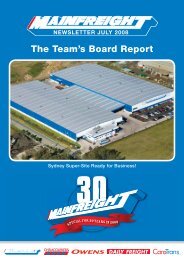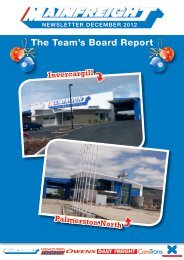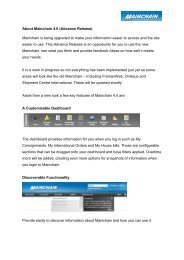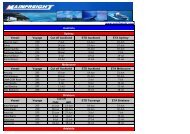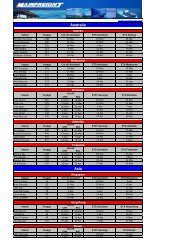Annual Report 2013 - Mainfreight
Annual Report 2013 - Mainfreight
Annual Report 2013 - Mainfreight
You also want an ePaper? Increase the reach of your titles
YUMPU automatically turns print PDFs into web optimized ePapers that Google loves.
Environment<br />
<strong>Mainfreight</strong> has always attempted to reduce<br />
the environmental impact of its operations.<br />
Our sustainability initiatives have often<br />
resulted in reduced costs; so the bottom<br />
line and the environment are both winners.<br />
We measure the carbon emissions we<br />
generate across our New Zealand and<br />
European operations, and over time will<br />
establish measurement across our global<br />
operations.<br />
We continue to lobby for the ability to move<br />
more domestic freight by rail particularly<br />
throughout New Zealand and Australia,<br />
because it is generally believed that trucks<br />
emit 4.6 times more CO 2 per tonne km<br />
carried than trains. It is critical for the wealth<br />
and productivity of all countries that rail<br />
services improve not only to reduce carbon<br />
emissions but also to improve the efficiency<br />
of their domestic transport infrastructures.<br />
In New Zealand, we continue to take the<br />
opportunity to build more freight facilities on<br />
rail-served land. We now have 13 rail-served<br />
sites in New Zealand and importantly, these<br />
sites are on the main freight corridors of<br />
New Zealand. We also continue to push for<br />
more New Zealand Government investment<br />
in improving rail infrastructure, and the<br />
Long-term environmental<br />
practises are an ingrained<br />
part of <strong>Mainfreight</strong>’s<br />
culture and thinking.<br />
viability of coastal shipping. Identifying rail<br />
freight opportunities in Australia, the<br />
United States of America and Europe<br />
remains difficult but not insurmountable.<br />
In Australia we are expecting to increase rail<br />
usage to compensate for the ever increasing<br />
shortage of owner operators willing to invest<br />
in vehicles.<br />
In seeking to reduce our<br />
emissions, <strong>Mainfreight</strong>’s<br />
initiatives include:<br />
> > Moving capacity from road to rail and<br />
coastal shipping<br />
> > Route planning – using GPS in congested<br />
international cities<br />
> > Truck size management – using smaller<br />
trucks for distribution within cities and<br />
larger trucks between cities<br />
> > Promoting off-peak distribution, particularly<br />
between cities and from ports<br />
> > Efficient driving techniques promulgated<br />
through our driver training programmes<br />
> > Vehicle maintenance guidelines for ownerdrivers<br />
to promote efficient running of<br />
their trucks<br />
> > The conversion of gas and diesel powered<br />
forklifts operating on our docks to electric,<br />
and the use of manual pallet trucks to<br />
replace forklifts where practicable.<br />
It is important to note that through good<br />
old-fashioned common sense, we have<br />
been recycling office and depot waste for<br />
25 years in New Zealand. We store and use<br />
rainwater and recycle greywater for truck<br />
washing, ablutions and irrigation. Where<br />
possible, our new freight and warehousing<br />
facilities in New Zealand and Australia are<br />
built with environmental design principles in<br />
mind; energy-efficient lighting and heating<br />
solutions; and solar power installations<br />
where feasible. Rain gardens are installed<br />
as a feature of our landscaped grounds.<br />
In Europe, the business has committed<br />
to the Netherlands sustainable logistics<br />
programme, with the objective of reducing<br />
carbon emissions by 30% in 2012 from<br />
levels recorded in 2007. For the Dutch<br />
fleet, we achieved a carbon reduction of<br />
27% in the 2012 calendar year, compared<br />
to baseline 2007, while the Belgium<br />
business reported a 22% reduction in 2012<br />
compared to 2010, in a voluntary national<br />
programme for sustainable logistics.<br />
24 <strong>Mainfreight</strong> | <strong>Annual</strong> <strong>Report</strong> <strong>2013</strong>



